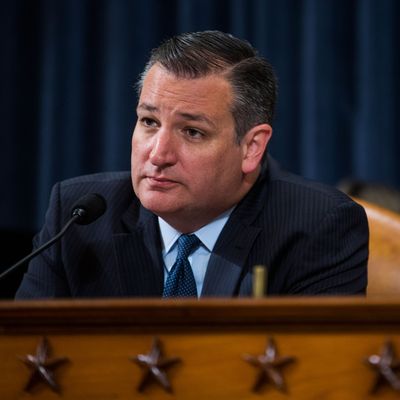
Ted Cruz is living proof that the invention of high-school debate was a world-historic error on par with the Manhattan Project. He is a seething mass of smug self-regard; a “populist” who, whilst at law school, refused to study with anyone who hadn’t gotten their bachelor’s degree at Harvard, Princeton, or Yale; an anti-Establishment gadfly who tried desperately to win a spot in George W. Bush’s inner circle; a one-time #NeverTrump conservative who spent much of the past year licking the president’s boots; and (almost certainly) a serial killer with a taste for cryptography, who terrorized Northern California throughout the late 1960s and early ‘70s.
And the Senate is probably going to be stuck with him for at least six more years.
Probably — not definitely. Texas is still a red state, and incumbent senators are still really hard to beat. But Democrats have provided Cruz with a formidable challenger: Congressman Beto O’Rourke. O’Rourke is photogenic, fluent in Spanish — and once played in a band with the frontman of the Mars Volta. More critically, the El Paso native has proven to be an excellent fundraiser. As the Texas Tribune reports:
U.S. Rep. Beto O’Rourke, D-El Paso, easily outraised U.S. Sen. Ted Cruz over the last three months in his campaign to unseat the Texas Republican, raking in over $2.4 million to Cruz’s $1.9 million.
… The Senate race has been a financial fight since the beginning. O’Rourke raked in more than Cruz in the second quarter of 2017, while Cruz outraised O’Rourke in the third quarter.
While Cruz has consistently held a lead in cash on hand, O’Rourke has been closing the gap. They are $2.7 million apart after the fourth quarter — compared with $3.5 million after the third quarter and $3.9 million after the second quarter.
O’Rourke’s haul is all the-more impressive for the fact that his campaign has refused to accept donations from corporate political action committees, a gesture that’s helped him attract tens of thousands of small-dollar donors.
These fundraising numbers — combined with the increasingly purple tint of Texas’s suburbs, the increasingly nonwhite share of its electorate, the myriad signs that 2018 will be a wave election for Democrats, the paucity of other halfway-plausible pickup opportunities for Team Blue in the Senate, and an October poll showing a plurality of Texans disapproving of Ted Cruz — have led progressives to invest their hopes (and small-dollar donations) in O’Rourke’s candidacy.
Still, the congressman’s odds remain long. While Texas University did find Cruz’s approval rating underwater last fall, a more recent survey from Morning Consult found 50 percent of Texans approving of Cruz, and only 32 percent disapproving. And while an internal poll from a Democratic interest group showed O’Rourke trailing Cruz by “only” 8 percent, the GOP’s internal polling has the Texas senator up by nearly 20.
But even if O’Rourke’s campaign proves unsuccessful, his strong fundraising is still significant. For one thing, winning isn’t everything in electoral politics: Voting is a habit – and a well-funded, serious campaign will get more left-leaning Texans into that habit, thereby laying the groundwork for future Democratic victories.
What’s more, O’Rourke’s prodigious fundraising suggests that Bernie Sanders’s formula for raking in campaign cash (swear off corporate money, then invite ordinary Americans to affirm that choice) is replicable. The 2020 Democratic primary field will — almost certainly — be full of progressive candidates with virtually identical policy views. O’Rourke’s example increases likelihood that at least one of those contenders will look to distinguish themselves by forswearing corporate cash. And that could conceivably change the balance of power within Blue America’s big tent.






























